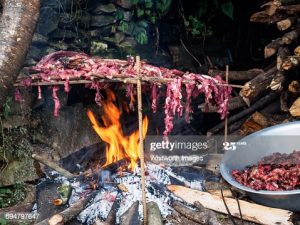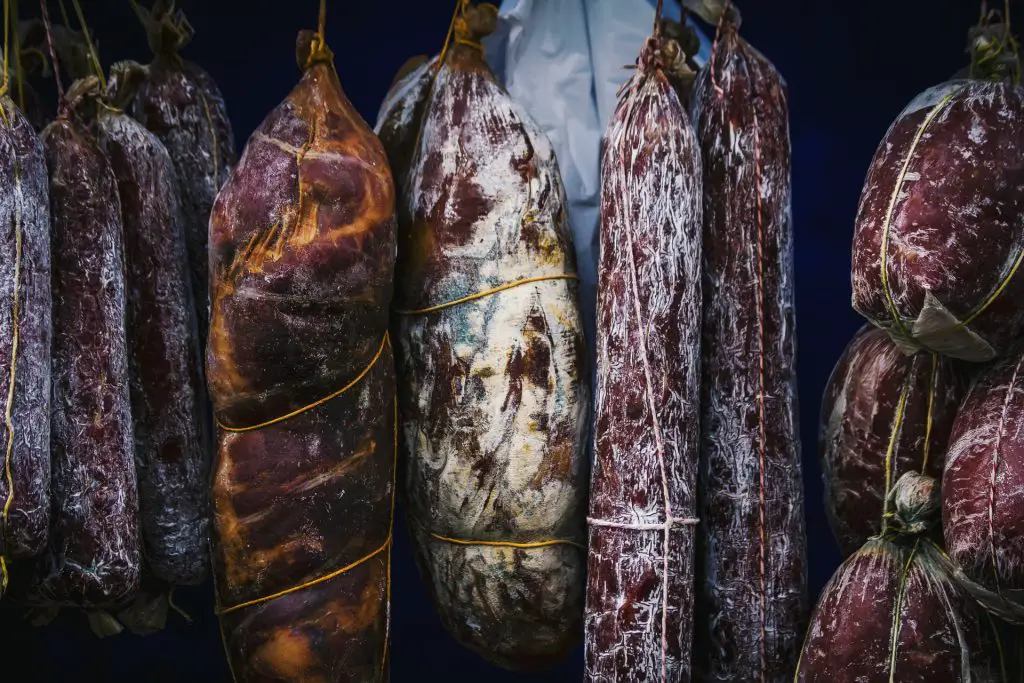Imagine you’re stranded in the wilderness, facing the stark reality of a food shortage. Driven by necessity, you embark on a hunting expedition and, against the odds, successfully procure an animal. However, a new challenge arises: the realization that you lack the knowledge to properly process the meat. This daunting task might leave you feeling overwhelmed and unprepared.
Suppose you manage to process the meat. The next hurdle you encounter is its preservation. Without modern conveniences, you find yourself at a loss for how to naturally preserve the hard-earned meat, potentially risking its spoilage after hours of hunting effort. This situation could lead to a sense of despair and helplessness in the wild, prompting you to reflect on the resilience and ingenuity of our ancestors. They thrived in such harsh conditions without the luxuries we take for granted today.
The secret to their survival lies in their mastery of primitive preservation techniques. This guide is designed to unveil these ancient methods, equipping you with the knowledge to effectively use primitive techniques for meat preservation in the wild. Read on to discover how you can apply these time-tested strategies for your survival in nature’s unforgiving environments.
Preservation of Meat
Preservation of meat is not only inclined to the use of sophisticated appliances that use electricity. Imagine there was no electricity, how will you preserve your food?
Our ancestors did not depend on electricity, they use simple equipment, yet they lived their life comfortably. They survived with simple tools and primitive preservation methods. They do not burden themselves with all the comfort we enjoy today.
Also, they lived longer without most debilitating diseases like cancer and diabetes that we faced today due to the preservation methods used, such as the addition of harmful ingredients.
Drying and Smoking Methods
Our forefathers used the process of drying and smoking methods to tackle the problem. The art of smoking dates back centuries ago. People of the old days simply hang their meat to dry. Their shelters were always smoky due to the lack of chimneys in caves.
Therefore they were able to realize that hanging out meat in such places with smoke added some kind of flavor to the meat and subsequently, preserve the meat for a longer period.
Learn how to dry and smoke meat in the wild, just like the way our ancestors had done by following the methods outlined below.
Find out more tricks on food preservation and preparation HERE.
Drying Meat in the Wild in 4 Primitive Preservation Steps
Trimming the Fat Away From the Meat
The first thing you need to do is to trim the meat. Doing this will remove fats that might cause rancidity. Hence prolonging the meat. If you are more of a survivalist, you can decide to store the fats to make tallow necessary for making Pemmican – a type of survival food. Check our website for more information about this.
Cut the Meat Into Thin Strips
The next thing is to cut the meat along the muscle fibers. You must ensure that you cut evenly for as long as possible. This is because meat generally shrinks during drying. So, take note of how you cut the meat. Although meat that is too long might break because of the weight.
Thicker slices would also take a longer time to get all the moisture out. Therefore, ensure you cut your meat well
Add Salt to the Meat
The best way to do this is to dip the meat into a salt solution. Salting is important because it adds flavor and taste, prevents the growth of microbes, and ultimately removes moisture from the meat.
It also helps to keep rodents away when you finally start to dry. Dip the meat for about 5 minutes in a salt solution before drying. You don’t need to worry about anything in the wild.
Suspend the Meat to Dry
Drying of meat can be done with metal hooks, threads, and metal clips. These methods will ensure that the meat dries perfectly, removing all the moisture that might be present. Do not try to hang the food under tree branches as this might cause harm to the meat.
Smoking Meat in the Wild in 4 Primitive Preservation Steps
The smoking of meat is related and connected to salting or drying. Smoking also removes moisture from the meat, which makes it last longer. Here is all you need to smoke meat in the wild.
Get All the Materials Needed
You need to prepare all the materials you will need to smoke the meat. These materials include primitive smokers, sharp tools for cutting and trimming the meat, materials to make fire, and also wood.
Wood
The kind of wood you choose to smoke your meat is very crucial. This is because the woods add some kind of flavor to the meat during smoking. Some common wood includes the alder, maple, apple, and oak.
Primitive Smoker
The primitive smoker is also important. You can use a pit smoker or a tripod to smoke the meat. Combining all together, start by devising a smoker, make fire using twigs of leaves, add the woods and you are ready to go
Prepare the Meat
Preparation of the meat involves trimming the fat off the meat, cutting it into strips, and adding salt to the surface of the meat just as described above
Remove the Meat’s Moisture
This is done by fixing the meat onto a stick and then placed above the fire you have prepared. This should be done for a short period as this is different from cooking. Doing this will prevent the growth of bacteria.
Smoke the Meat
The next thing is to start with smoking properly. This should be done by allowing the fire to create a lot of smoke using the right wood as this will add a kind of flavor to the meat.
You don’t need to worry about flies or other insects that harm food normally because the smoke generated keeps them off. This should be done for 6-8 hours.
You can check to know whether the meat is done by observing the dryness. If the meat bends, it means it is not done, and if it cracks, it shows it is dried.
You may be interested in
| How Long Does An Energy Drink Last? |
| Recipe: How to Make Hardtack (What is Hardtack?) |
| What Are Natural Headache Remedies? |
Conclusion
It is advisable to cook meat properly before consumption, but when you are in the wild drying and smoking can be the only available option to preserve your meat primitively and hence survive. However, smoking and drying isn’t the last thing to do in the wild.
You should store your smoked and dried meat properly to prevent meat illness arising from the growth of microbes. Since you are not getting a refrigerator anytime soon, you can use foils to store the meat. We recommend that you find time to learn and practice this survival skill.
It can be learned at home without taking too many resources. Try it out now to keep you prepared for any survival situations. For more informational tips about survival and related topics, feel free to check our website.
Hope you have gotten the best information from this guide. See you next time!
Find the complete step-by-step survival guides on our website.



